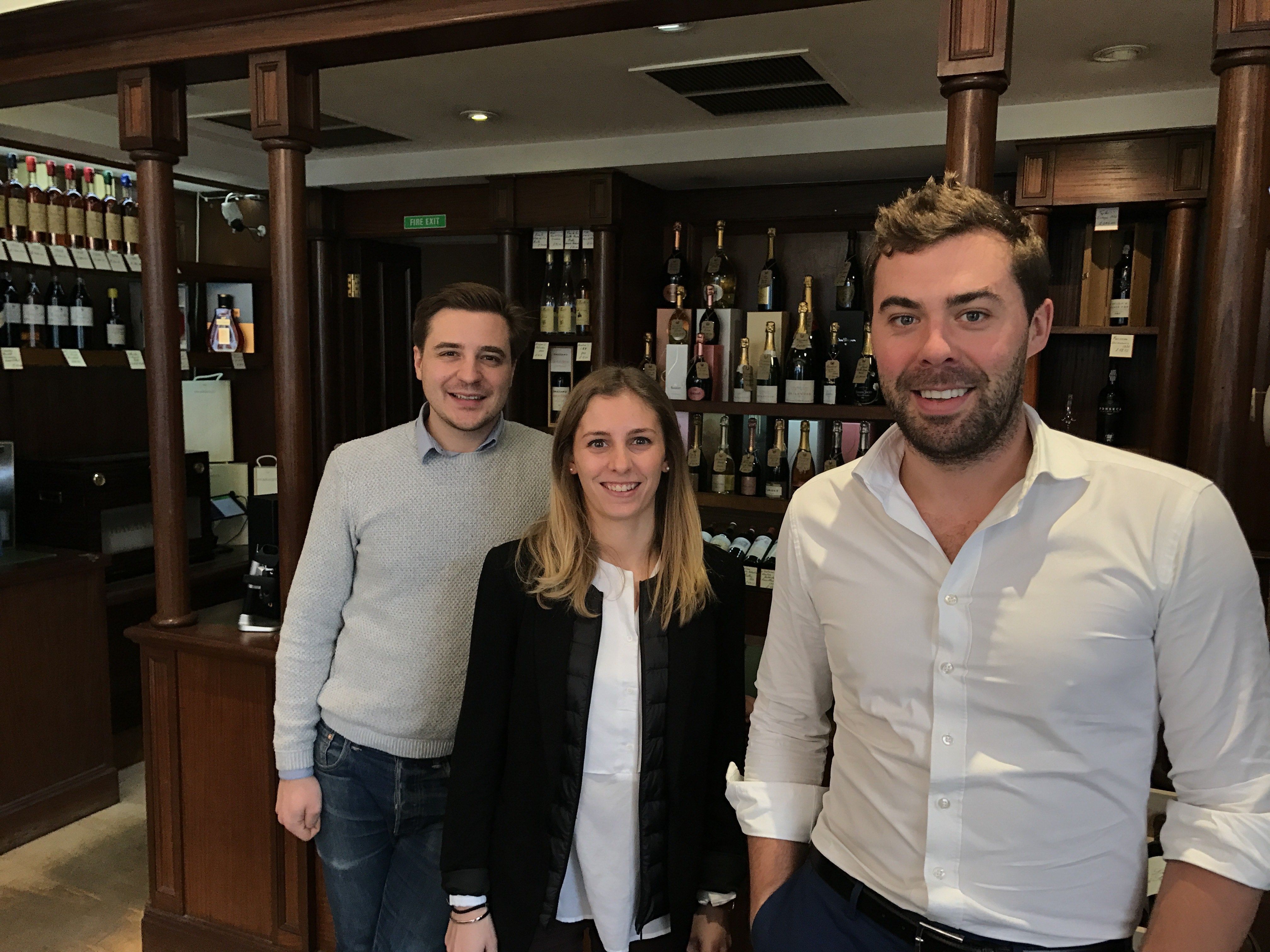Friarwood is combining its traditional wine merchant skills and reputation with serious investments in new technology to help make fine wine relevant and accessible to the new generation of on demand customers.
The world of wine as we know it is essentially made up the Old and the New World way of doing things. Split as a rough rule of thumb right along the equator with the old traditional, historical wine producing countries in the northern hemisphere, looking metaphorically down on the New World wine producers operating across the south of the globe.
Now those lines are increasingly blurring the more wine producers and winemakers from both sides of the equator venture north or south to pick up ideas, inspiration or simply find out what all the fuss is about in their respective parts of the world.
Now let me introduce you to Friarwood. For many older, more established wine trade figures Friarwood will be known very much as the Old World, mostly Bordeaux and French dominated fine wine business started up by Peter Bowen way back in 1967.
For younger wine buyers out there then Friarwood is still the same company, it is just known for having a very different approach and team in charge. Where the emphasis is arguably more of a blurring between the Old and New Worlds of fine wine. And orders taken down by pen and paper have been replaced by wifi and e-commerce.
A team that has thankfully been able to capture the vision – and the business – of the late Bowen to not only keep it going, but rework it for the next generation of wine buyers and fine wine lovers.
On the face of it you would not think anything has changed. The Friarwood wine merchants and head office is still situated along the New King’s Road, just around the corner from Parsons Green.
It is still very much a traditional wine merchant with bottles of fine Burgundy and Bordeaux in the window.
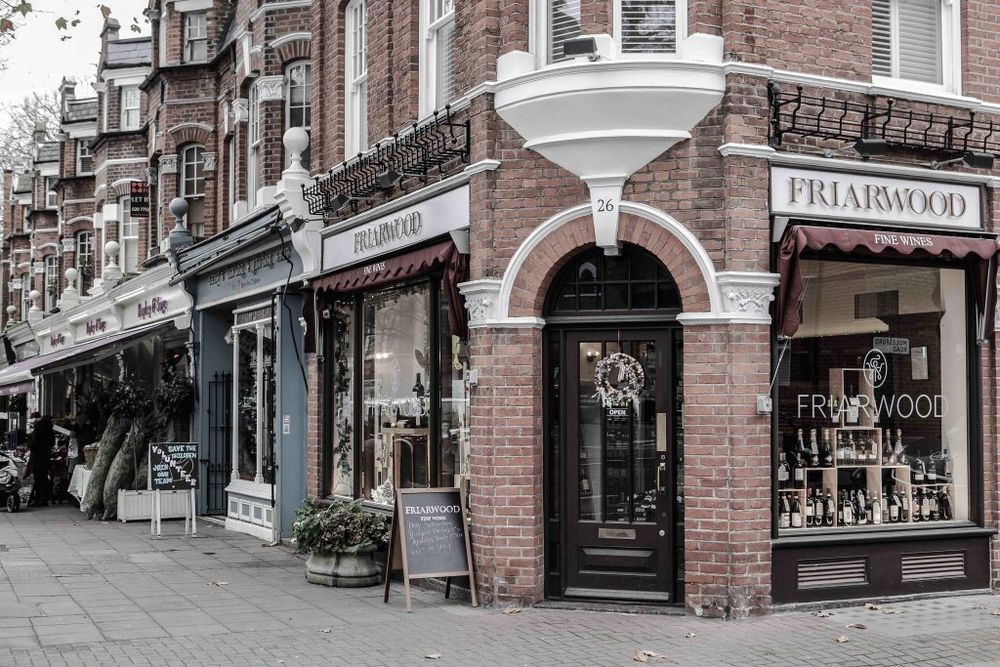
Friarwood’s traditional home on the New Kings Road
Changing times
But scratch below the surface and a very different type of wine merchants is beginning to appear.
A wine merchants still very much in touch with its heritage, but one that is trying to make itself even more relevant for today’s wine buyer, be it in the trade or amongst fine wine enthusiasts.
Interestingly the management team at Friarwood all met each whilst studying for an MBA at the business school in Bordeaux between 2011 and 2012. Talk about putting ideas and theories in to practise.
What’s more they all bring, as we shall see, different skills to the table.
Ben Carfagnini proved to be their route in to Friarwood when he first worked for the business back in 2010 when he moved to London from Canada, where he turned his back on a previous career as a landscape architect.He initially took an unpaid internship role, and was welcomed back when he had completed his MBA to take over the on-trade sales side of the business in 2014. Following Bowen’s death, the family were keen to see him take on the business which he did in 2015.
Edouard Dautreix was enticed over from his role at Liv-Ex to help manage the finance and logistics side of the business.
Auriane D’Aramon is the one with the greatest wine credentials having being born in to a Premier Grande Cru Classe winemaking family in St Emilion in Bordeaux. But it is the business rather than the making part of the wine industry that she is interested in.
The three are ably supported and backed up Patrice Jegat, a former sommelier, who heads up the retail shop side of the business.
“It is a big advantage to start a business with a name of the reputation and standing of Friarwood,” she says. “It’s fair to say we have the philosophy and attitude of a start up company, but we have clients and customers already well established.”
Onwards and upwards
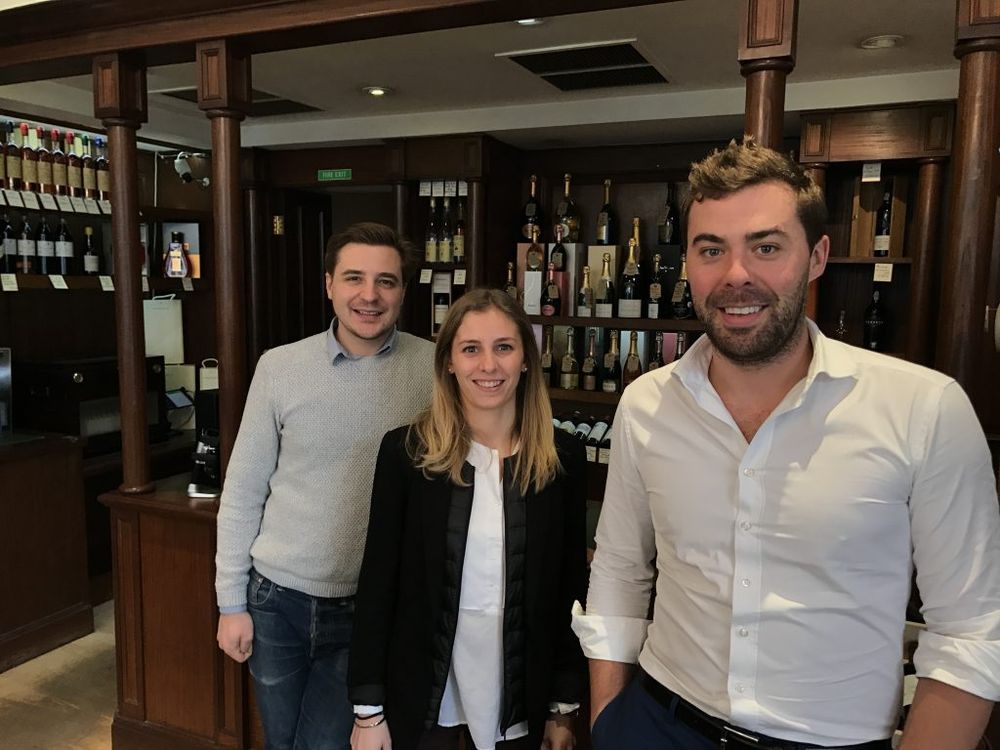
The new Friarwood team, Eduoard Dautreix, Auriane D’Aramon and Ben Carfagnini
All three clearly fully appreciate the legacy that they are being able to carry on. Carfagnini regularly refers back to Bowen and his principles throughout our chat, particularly his true passion for Bordeaux. A passion that saw Friarwood, claims Carfagnini, grow to become one of the most important distributors of Bordeaux wine to the on-trade in the country.
“It is definitely an honour for me to be able to help play my part in taking on the business. Before he died I had grown up to feel part of his family and he was almost like a grandfather figure to me,” he says.
It was, therefore, an even bigger step to take on the business when he died. “It was a big step, but one I knew I was capable of doing.”
Even more so when D’Aramon and Dautreix decided to join him. “We all have the same philosophy for business and also have very complementary skills,” says Dautreix.
Which essentially means Carfagnini heading up the sales side, Dautreix the operations and logistics and D’Aramon the buying. “We all have our own specialism,” explains Dautriex.
Re-shaping and re-building
For the last two years a lot of their time has been putting the business on to a footing where they feel comfortable now talking about it.
Not that they have had to completely re-invent the wheel as Friarwood not only has long standing customers, but has rock hard business foundations.
After all where Bowen originally made his mark was in sourcing and supplying Bordeaux and classic French wine estates that his competitors weren’t going to. So he deliberately bypassed the main negotiants to seek out estates where he could potentially get exclusive access to large parts of their production. It was that level of control and close contact directly with growers and estates off the beaten track that would separate Bowen from many of his larger competitors and give Friarwood its niche in the fine wine market place.
It meant having good relationships with bank managers as Bowen was buying up huge volumes of wine, most of which would not see the light of day for a good 10 to 15 years. He quickly became one of Octavian Cellars biggest early customers, says Carfagnini.
What he did not have, though, was the most up to date records, book keeping and management and process systems. Never mind a website. Hence the trio’s MBA skills have been put to good use getting the financial, stock and management side of the business back up to speed.
When they took on Friarwood they had the difficult, but also unique task of deciding which parts of the outstanding wine stocks they would keep, and which parts went back in to the trade.
“We picked and choose what we thought we wanted,” recalls Carfagnini. Which included coming across a 1,000 cases of Lafite. “You have to remember that Friarwood was 100% Bordeaux up to about 2000,” he adds.
Growth through technology
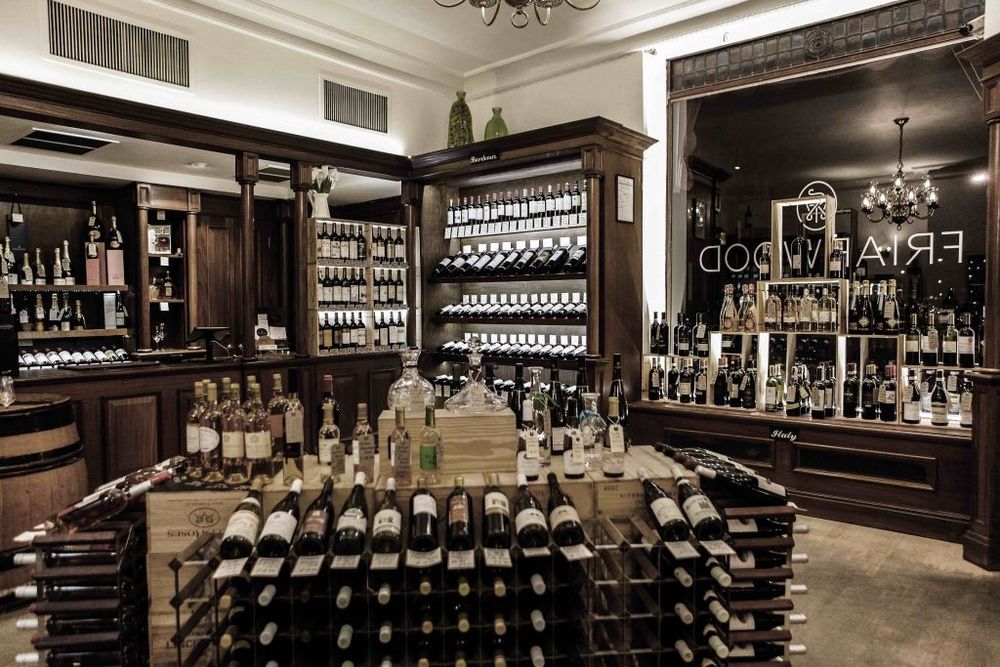
The retail side of the business is now supported by a full integrated EPOS and management system
One aspect of the new business that is very different to its past is the level of technology that is now being used to drive it forward. Technology that is focused on improving its customers service and making it far more than a traditional wine merchant or retail business.
“We are trying to make technology a key part of the business. There are a lot of gaps in business that can now be filled by technology,” says Carfanini.
Not that they are simply following the latest technical fad. But they see technology, adds Dautreix, as a way of providing a much better service to its customers as they are much more on top of their pricing, their systems, and their costs, right through the supply chain.
Where it is standing out from the pack is the work it is doing to partnering with on demand takeaway services such as Deliveroo. It was one of the first wine businesses to sign up to the platform and users can now use it to order wine as well a local Chinese, Thai or pizza takeaway.
It means being on your toes and being ready to accept and prepare orders within less than 20 minutes. So it is clearly only available during core business working hours. It is now working with Deliveroo to change the choice of wines it has to better suit customers’ needs at different times of the year. But it has seen orders vary from £10 to £1,000.
E-commerce breakthrough
It has also developed its own e-commerce site enabling it to trade and sell wine online for the first time.
“Ecommerce is something we definitely want to push,” says Carfanini. “It also shows our producers that we are looking to promote their wines in as many ways as possible.”
Being able to start from scratch has also allowed the team to invest in the latest e-commerce systems and Friarwood has introduced a Cloud-based, ipad-operated EPOS and stock system which allows them to drill down in to real time analysis of individual sales.
It is also ideally positioned to make the most of the online and on demand business as it has a storage cellar below its retail shop in Chelsea that has capacity for 15,000 wines. It really is a treasure trove of classics going right back through the years. It can also use its own delivery van as well as hook up with local courier services through the Shutl platform, that will find the nearest available courier at any one time.
Dautreix says the potential is there to offer a very different service to completely new customers that are happy to pay more for convenience of using on-demand services. It is also an area that a lot of traditional wine companies are not looking at, he says.
“The wine industry is not focused on what the consumer is doing or wants. They are still trying to dictate to consumers when and where they can receive their wine,” he says. It ultimately comes down to investing in technology that allows you to fulfil orders within a very tight timeframe.
It is an area that they believe could be expanded in to restaurant deliveries, providing outlets with a completely different kind of service, where they have access to more exclusive and interesting wines.
Wholesaler and retailer
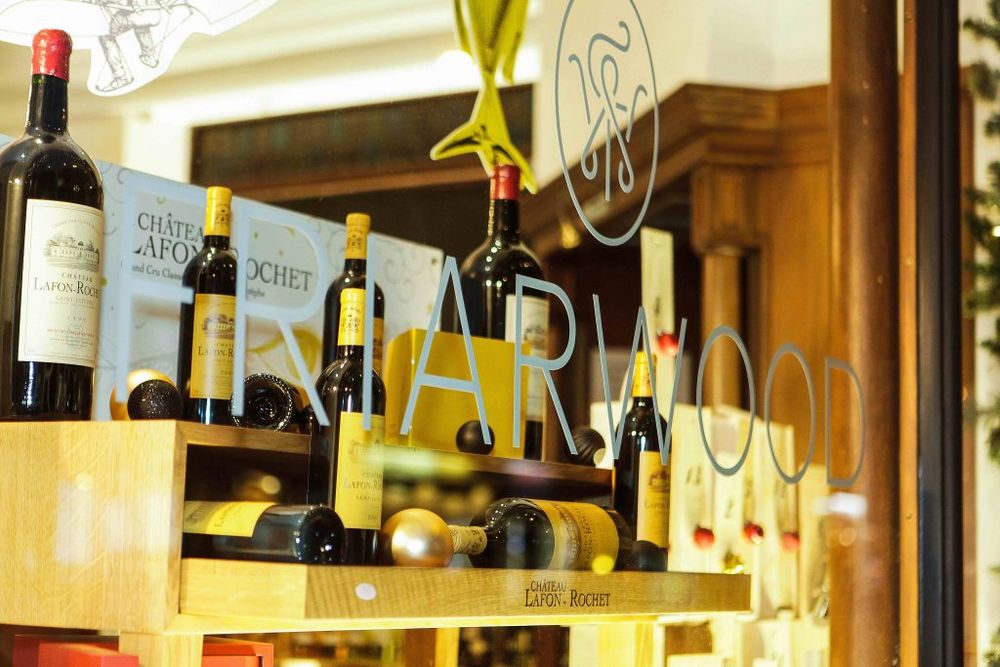
Around 75% to 80% of the Friarwood business remains a traditional wine merchant model serving key customers in all channels of the on-trade from pubs through to Michelin star restaurants.
It has meant broadening its range (to around 800 wines) and building on its reputation as a classic French wine supplier in to other countries as well, particularly the New World. Although Bordeaux, Burgundy and France still makes up the majority of lines, some of the highlights of its recent tasting came from Italy, South African (Capensis Chardonnay 2013), Argentina, the US, Canada and Bulgaria (Castra Rubra), as picked out by Wine Behind The Label.
D’Aramon says it is hopefully a lot more reactive to market needs and trends. “Having the retail side of the business is very important as you can see what it is selling and hear directly from customers what they think about certain wines. That is, for example, where we see the trend for lighter style reds coming through,” she explains.
In fact if their plans fall in to place then the retail part of the business is going to be even more important as it is looking to open new sties and become known as a wine retail merchant in its own right.
Jegat’s experience as a sommelier certainly makes a big difference to how they can talk to their customers. As is their offer which allows customers to buy directly from the shop past vintages of in demand wines.“There are not many places you can come in and enjoy a taste of an open bottle of a back vintage,”says Carfagnini.
“The operation is certainly scaleable,” adds Dautreix, but only if the operations side of the business can cope with it. “We now have the systems in place. It is a case of finding the right locations.”
Combined palate
Whilst D’Aramon is responsible for sourcing wines to taste, the final selection comes down to the senior management team and Jegat. She believes their combined palates are quite representative of what the market is looking for. Their challenge is to find wines that tick the classic, traditional boxes, but also leave room for more unusual and challenging wines as well.
They are also fully aware that they can’t compete on price with some of the larger national distributors and therefore need to be work harder to find wines that stand out. “We want wines with a talking point,” says Dautreix.
They are also looking for wines with a bit of age and experience, he adds.
Which is where their network of customers and contacts is invaluable in suggesting and recommending growers to work with, says D’Aramon.
Dautreix agrees: “We have discovered some new winemakers by asking other winemakers for their recommendations in a certain region. Or some of our sommelier customers. It is who you know, and who you can trust.”
Which is very much the way Friarwood has gone about its business for its first 50 years.
